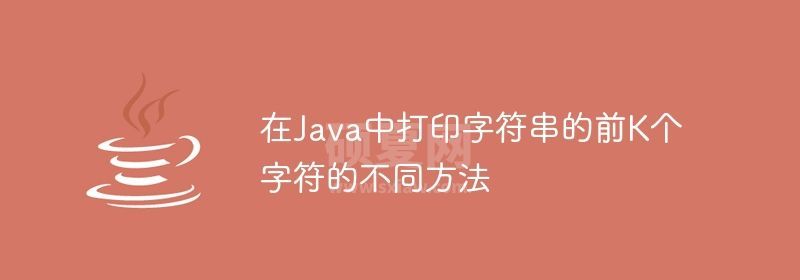在Java中打印字符串的前K个字符的不同方法

A string is a class in Java that stores a series of characters enclosed within double quotes.Those characters are actually String-type objects. The string class is available in the‘java.lang’ package. Suppose we have given a string and a positive integer ‘k’. Now, thejob is to print that string's first 'k' characters in Java. Also, check whether the length ofgiven string is less than or not, if so print the original string.
Java Program to Print First K Characters of the String
Let’s understand the given problem with a few examples −
实例
String st1 = “TutorialsPoint”; String st2 = “Tutorial”;
假设我们已经有了上述字符串,并且给定 k 值为 9。那么,结果将是 −
The first K characters of st1: Tutorials The first K characters of st2: Tutorial
字符串1的长度大于9,因此我们打印了前9个字符。但是,字符串2的长度小于9,因此我们打印了整个字符串本身
方法一
Create a user-defined method along with two parameters of String and integer type.
Convert the given string into a character array and store it in ‘chs[]’.
We know that strings are immutable in Java therefore we need to create an object ‘new_st’ of the StringBuffer class to store characters of string into a character array
使用if-else块检查字符串的长度。如果长度大于k,则将前k个字符追加到字符数组中,否则打印给定的数组。
现在,在main()方法中,声明并初始化字符串和一个正整数k。然后,使用字符串和k作为参数调用用户定义的方法
示例
以下示例说明了如何使用用户定义的方法来检索字符串的前K个字符。
import java.util.*;
public class Kstring {
public static void frstChar(String st, int k) {
char chs[] = st.toCharArray(); // converting into character array
StringBuffer new_st = new StringBuffer();
if(st.length() > k) { // checking the length of string
for(int i = 0; i < k; i++) {
new_st.append(chs[i]); // appending characters to new string
}
System.out.println("The first K characters are: " + new_st.toString()); // printing the new string
} else {
System.out.println("K is greater than given String: " + st);
}
}
public static void main(String args[]) {
String st1 = "TutorialsPoint";
String st2 = "Tutorial";
int k = 9;
System.out.println("The Original String: " + st1);
System.out.println("The Original String: " + st2);
// calling the method
frstChar(st1, k);
frstChar(st2, k);
}
}
Output
The Original String: TutorialsPoint The Original String: Tutorial The first K characters are: Tutorials K is greater than given String: Tutorial
Approach 2
声明并初始化一个字符串和一个正整数‘k’。
Now, using the if-else block check whether the length of String is greater than k or not. If it is greater than k, print the same number of characters of string using ‘substring()’ method otherwise print the whole string.
内置方法 'substring()' 接受两个整数类型的参数,并打印指定字符串中在参数范围内的字符。
Example
The following example illustrates how we can retrieve the first K characters of a String using an in-built method ‘substring()’.
public class Kstring {
public static void main(String args[]) {
String st1 = "TutorialsPoint";
int k = 9;
System.out.println("The Original String: " + st1);
if (st1.length() > k) { // checking the length of string
System.out.println("The first K characters are: " + st1.substring(0, k));
} else {
System.out.println("The first K characters are: " + st1);
}
}
}
Output
The Original String: TutorialsPoint The first K characters are: Tutorials
Conclusion
我们通过定义String并理解Java程序的问题陈述来开始本文。后来,我们讨论了两个示例程序,一个使用用户定义的方法,另一个使用内置方法来打印给定String的前K个字符。
以上就是在Java中打印字符串的前K个字符的不同方法的详细内容,更多请关注其它相关文章!
